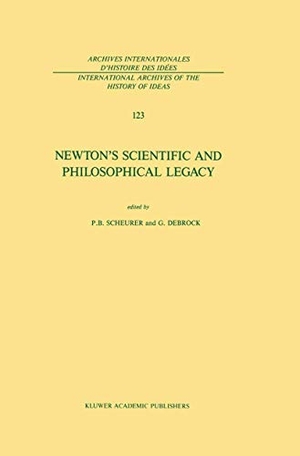Für statistische Zwecke und um bestmögliche Funktionalität zu bieten, speichert diese Website Cookies auf Ihrem Gerät. Das Speichern von Cookies kann in den Browser-Einstellungen deaktiviert werden. Wenn Sie die Website weiter nutzen, stimmen Sie der Verwendung von Cookies zu.
Cookie akzeptieren
Newton¿s Scientific and Philosophical Legacy
- Springer Netherlands
- 2012
- Taschenbuch
- 396 Seiten
- ISBN 9789401077644
This volume contains the Proceedings of the International Colloqui um "Newton's Scientific and Philosophical Legacy", that was held at the Catholic University of Nijmegen (The Netherlands) from June 9th to 12th 1987 to celebrate the Tercentenary of the publication of Newton's Philo sophiae Naturalis Principia Mathematica (1667). Although 1987 was a busy year for Newton scholars, we were happy that five of most prom inent among them were able to come to Nijmegen and speak on the vari ous aspects of Newton's thought. They are the Professors I. Bernard Cohen (Harvard), Gale Christianson (Indiana State), B. J. Dobbs (Northwestern), Richard H. Popkin (UCLA) and Mordechai Feingold (Boston University). No doubt, recent scholarship has put Newton's genius in a quite different perspective from the one that had come to make up what may be called Newtonian mythology. Although his achievements in the areas of mechanics, mathematics, and optics remain indisputed, Newton's scientific efforts were apparently entirely subordi nate to his religious beliefs. This volume has been divided into four parts, preceded by a Pream ble in which Prof. Christianson offers a vivid portrait of Newton as a
Mehr
Weniger
zzgl. Versand
in Kürze